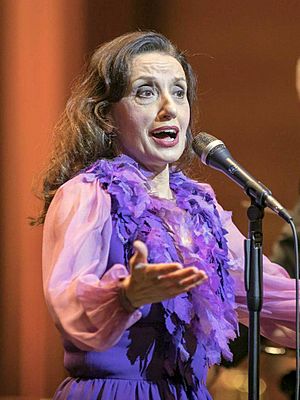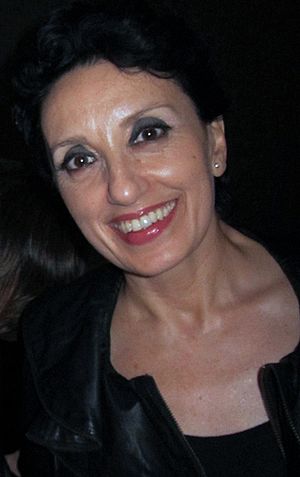Luz Casal facts for kids
Quick facts for kids
The Marchioness of Luz y Paz
|
|
|---|---|

Casal in 2018.
|
|
| Background information | |
| Birth name | María Luz Casal Paz |
| Born | 11 November 1958 Boimorto, Galicia, Spain |
| Genres |
|
| Occupation(s) |
|
| Years active | 1980–present |
| Labels |
|
Luz Casal (born November 11, 1958) is a famous Spanish pop and rock singer. Her full name is María Luz Casal Paz. She grew up in Boimorto, Galicia, a region in Spain.
From a young age, Luz took classes in singing, piano, and ballet. She later moved to Madrid to start her career as a musician. She became very popular in the early 1980s. Her music style grew into a softer pop sound over time.
Luz Casal recorded a Spanish version of a French song called "Un nuevo día brillará." This song became a big hit. Throughout her career, she has sold more than five million albums.
In 1992, she gained even more fame. She sang the song "Piensa en mí" for the movie High Heels, directed by Pedro Almodóvar. This song was originally by Agustín Lara.
Luz faced some health challenges in 2007 and 2010. She bravely shared her journey with the public. Her middle name, Luz, means "light" in Spanish.
Contents
Biography
Early Life and Music Start
Luz Casal is the daughter of José Casal and Matilde Paz. When she was young, her family moved to Avilés and then to Gijón. In Gijón, she performed for the first time in front of an audience. She continued her piano and ballet studies there.
Luz was part of a rock group called Los Fannys. They played cover versions of other artists' songs. She also sang in another band that performed in different parts of Spain. But Luz always dreamed of being a solo singer.
In 1977, Luz moved to Madrid to pursue her dream. She made her first recording, "La guapa" ("The Beautiful"). She worked as a backing singer for other artists. This helped her learn about the music business. She also started writing her own songs.
In 1980, Luz released her first single with a big music company. It was called "El ascensor" ("The Elevator"). This song had a reggae style, inspired by Bob Marley. She also took dance classes to improve her stage presence.
First Albums and Tours
In 1981, Luz joined the Zafiro music company. The next year, she recorded her first solo album, simply titled "Luz." It was released in September 1982. The album included songs she wrote herself and some by Roque Navaja.
In 1983, she filmed a music video for her song "No aguanto más" ("I Can't Stand Anymore"). She then started performing live concerts. She joined a big tour called "El rock de una noche de verano" (The Rock of a Summer Night). She performed in 35 cities across Spain with Miguel Ríos and Leño.
Her second album, Los ojos del gato ("The Eyes of the Cat), came out in 1984. Some songs from this album became popular in Europe. Luz kept learning, taking classes in piano, chorus, and performance. In 1985, her album Luz III was released. It featured a popular song called "Rufino."
In 1986, Luz gave over 90 concerts. She also recorded a song called "The Water Is Life" for an environmental campaign. She sang it with famous artists like Mark Knopfler.
Rising to Stardom
In 1987, Luz released her album Quiéreme aunque te duela ("Love Me Even If It Hurts You). With this album, she started to sing more ballads. These slower songs became very popular. The song "A Cada Paso" became a huge hit in Latin America. It reached number one in countries like Argentina, Chile, and Mexico.
In 1989, Luz signed with a new record label, Hispavox. She released the album V. This album sold over 300,000 copies. It included two of her most important songs: "Te Dejé Marchar" ("I Let You Go") and "No Me Importa Nada" ("Nothing Matters for Me"). That year, she also performed at a festival in Chile for human rights.
In 1991, Luz released A Contraluz ("Backlight). This album sold over 400,000 copies. It featured the bolero "Piensa en mí" and "Un año de amor." These songs were chosen by director Pedro Almodóvar for his film Tacones Lejanos ("High Heels). These hits made her famous across Europe, especially in France.
After this success, Luz took a break from recording for four years. However, she continued to perform live in Spain, Latin America, and other European countries.
In 1995, Luz released Como La Flor Prometida ("Like the Promised Flower). This album became her most successful, selling over 800,000 copies. In 1996, she released a collection of her best songs called Pequeños Y Grandes Exitos. She also released a special album for France in 1998. Luz performed in famous theaters in Paris, becoming the first Spanish pop singer to do so.
Later Albums and Awards
In 1999, Luz released Un Mar De Confianza ("A Sea of Trust). This album sold over 600,000 copies. The song "Mi Confianza" ("My Trust") won an Ondas Award for Best Song. She then went on a tour across Europe.
In 2001, she won a Goya Award for Best Original Song. This was for the animated film El Bosque Animado ("The Living Forest).
In November 2002, Luz released Con Otra Mirada ("With Another Look). In October 2004, she released Sencilla Alegría ("Single Happiness). This album included different music styles, from flamenco to jazz. It also featured "Negra Sombra" ("Black Shadow"), a poem set to music. This song was part of the soundtrack for the movie Mar Adentro.
After overcoming health challenges, Luz released her new single "Se Feliz" ("Be Happy") in 2007. It was from her album Vida Tóxica ("Toxic Life). This album was inspired by her experiences. Vida Tóxica was released in November 2007.
In 2009, she released La Pasión ("The Passion). This album was a tribute to famous bolero singers from the 1940s to the 1960s. It included her versions of songs like "Alma Mía" ("My Soul") and "Historia De Un Amor" ("The History of a Love"). The album became very successful in Spain and France. Luz also received the Medal of Arts and Culture of France.
In 2011, she released Un ramo de rosas, a collection of her love songs. Two years later, in 2013, she released the studio album Almas gemelas ("Twin Souls).
After a break, Luz released a covers album in France in 2017. It featured songs by Dalida, a French singer who inspired Luz. In 2018, she released the album Que corra el aire ("Let the Air Flow). This album was well-received by critics.
Discography
Albums and Singles
| Year | Album title | Peak position SPA |
Peak position FRA |
Singles from the album |
|---|---|---|---|---|
| 1977 | 1977: "La guapa" | |||
| 1980 | 1980: "El ascensor" | |||
| 1982 | Luz | 1982: "No aguanto más" 1982: "Ciudad sin ley" 1982: "Eres tú" |
||
| 1984 | Los ojos del gato | 1984: "Los ojos del gato" 1984: "Detrás de tu mirada" 1984: "Secreto" |
||
| 1985 | Luz III | 1985: "Voy a por ti" 1985: "Rufino" 1985: "Hechizado" |
||
| 1987 | Quiéreme aunque te duela | 1987: "Quiéreme aunque te duela" 1987: "Un día marrón" 1987: "Qué rabia" 1987: "A cada paso" |
||
| 1989 | Luz V | 1988: "Te dejé marchar" 1989: "Loca" 1989: "No me importa nada" 1990: "El tren" 1990: "He visto a un ángel" |
||
| 1991 | A contraluz | 1991: "Piensa en mí" 1991: "Un pedazo de cielo" 1991: "Un año de amor" 1992: "Es por ti" 1992: "Tal para cual" |
||
| 1995 | Como la flor prometida | 1995: "Entre mis recuerdos" 1995: "Lo eres todo" 1995: "Besaré el suelo" 1996: "Plantado en mi cabeza" 1996: "Te ofrezco lo que tengo" |
||
| 2000 | Un mar de confianza |
|
1999: "Mi confianza" 2000: "Sentir" 2000: "Sumisa" |
|
| 2002 | Con otra mirada |
|
|
2002: "Ni tú ni yo" 2003: "Dame un beso" 2003: "A veces un cielo" 2003: "Pueden ser tantas cosas" |
| 2005 | Sencilla alegría |
|
|
2004: "Un nuevo día brillará" 2005: "Sencilla alegría" 2005: "Ecos" 2005: "No te vayas" |
| 2007 | Vida tóxica |
|
|
2005: "Sé feliz" 2007: "Soy" 2007: "18 años" |
| 2009 | La Pasión |
|
|
2009: "Con mil desengaños" 2009: "Historia de un amor" 2009: "No, no y no" |
| 2011 | Un ramo de rosas |
|
|
2011: "Un ramo de rosas" 2011: "Gracias a la vida" |
| 2013 | Almas gemelas |
|
|
2013: "¿Por qué no vuelves, amor?" |
| 2017 | Luz Casal chante Dalida, A mi manera (France only) |
|
2017: "Fini la comédie" | |
| 2018 | Que corra el aire |
|
2018: "Miénteme al oído" |
Compilation Albums
- Pequeños y grandes éxitos (1996)
- The Best of Luz Casal (1998)
- Pequeños, medianos y grandes éxitos (2006) (also separate French edition for France)
Soundtracks
- Tacones lejanos (1991)
- El Bosque animado (2001)
See also
 In Spanish: Luz Casal para niños
In Spanish: Luz Casal para niños
 | Kyle Baker |
 | Joseph Yoakum |
 | Laura Wheeler Waring |
 | Henry Ossawa Tanner |


